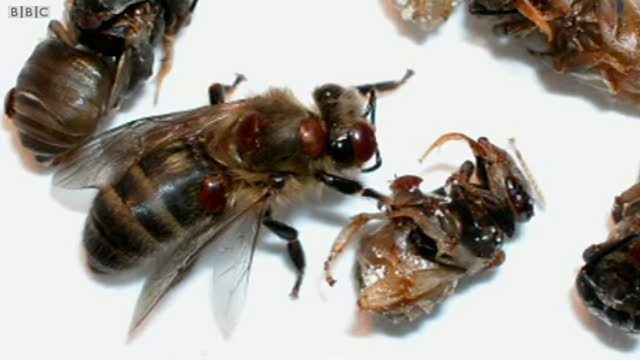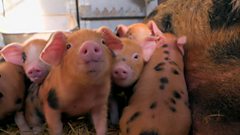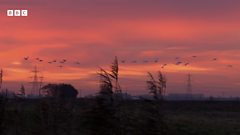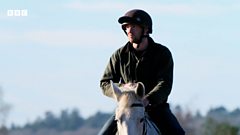
Honey bee loss
In 2008, Countryfile reported on the large scale losses being experienced by British beekeepers. Two years on, scientists are continuing their efforts to find a cause and solution to this problem. Fears remain that a massive population collapse would have a serious affect on agriculture. Is time running out for honey bees? And what might the effect of a population collapse be?
Spring is a beautiful time of year, blossom in the trees, flowers in the garden, birds singing and bees buzzing. But fast forward 10 years, and the orchard is empty, the garden dying. Why? Because there are no bees. Ok so this might seem a bit far fetched, but this is a scenario rooted in reality. The flowers in our garden and our commercial crops all need pollinating, and one of the most efficient pollinators we have is the honey bee. The pollination they do is worth 拢165 million each year to British agriculture. We are used to having a lot of choice in what we eat, but if you take bees out of the equation, then 80% of the food on supermarket shelves would disappear. Beekeepers across the country are reporting more bee losses year on year. Beekeeper Doug Isles has suffered real problems over the winter; he has had Queen failure. This is where the queen continues to lay eggs, but instead of producing good quality sterile female bees which do all the work, the queen produces male bees, or drones. If all you get is drones, you don't get any honey. Over a normal winter season Doug Isles would expect to lose 5% of his hives, yet this time he has lost over 30%, a very serious problem. And Doug is not alone. Reports from professional bee farmers suggest they are losing 60-70% of their bees, which will have a devastating effect on agriculture eventually. The Government's bee unit in York is trying to work out what is happening. Until now the biggest affect on bee colonies has been the British weather. Bees can't fly when it's too cold, too wet or too windy. But there is now also a big influence from pests and diseases on colonies in the UK. One of the biggest problems they face is the varroa mite, imported into Britain in 2002 which is now endemic. Worse, the mite has developed resistance to many of the drugs beekeepers are allowed to use to control it. The varroa mite is the equivalent of having a saucer-sized parasite feeding on you. It drinks the blood, it injects viruses while it's doing this and it can suppress the immune system. The mite stresses the honey bee colony and anything that causes stress reduces the lifespan of the bees. A further problem lurking in the hives colony collapse disorder, CCD, blamed for wiping out a third of all hives in the United States last year, severely affecting $15 billion worth of crops. And one year on it's still not exactly clear what this disorder is or whether is has arrived here. There is a virus which has been found in relation to this disorder and as yet it hasn't been found in the UK. Our colony collapses seem to be related to the presence of varroa mite. On a large study it seems that even if varroa has been brought under control the fact that the hive was affected by the mite in the past means the associated viruses are still present in the bees and may contribute to the losses. Along with other research, scientists are now looking at how far bees travel for food and what impact that has on them. If bees have to travel quite far for food, and if the colony is already suffering from disease, it might be harder for those bees to travel that distance to obtain the food, and if they don't have enough food they might be more susceptible to disease. It's a vicious circle. It is said, although disputed, that Eistein worked out, that if honey bees were to die out, man would follow four years later. DEFRA is consulting on the way forward, but money is a sticking point.
Duration:
This clip is from
Featured in...
![]()
大象传媒 Nature
Be captivated, informed and inspired by the world's wildlife.
![]()
Bees are brilliant
A collection of clips illustrating the importance of the honey bee and its recent decline.
More clips from Countryfile
-
![]()
The cutest sight you鈥檒l see today!—Mourne Mountains
Duration: 03:33
-
![]()
The swans causing a sensation!—Welney Wetland Centre
Duration: 04:08
-
![]()
A winter's day walk can change your life—Winter Walks
Duration: 02:36
-
![]()
Is this the BEST job in the UK?—New Forest
Duration: 01:33






